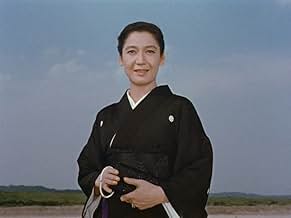Kohayagawa-ke no aki
- 1961
- 1 घं 43 मि
अपनी भाषा में प्लॉट जोड़ेंThe family of an older man who runs a small sake brewery become concerned with his finances and his health after they discover him visiting an old mistress from his youth.The family of an older man who runs a small sake brewery become concerned with his finances and his health after they discover him visiting an old mistress from his youth.The family of an older man who runs a small sake brewery become concerned with his finances and his health after they discover him visiting an old mistress from his youth.
- पुरस्कार
- 1 जीत और कुल 1 नामांकन
फ़ीचर्ड समीक्षाएं
Ozu's penultimate film, and perhaps this is reading too much into it, but its hard not to see his vision of his own impending death in it, despite the great humour in it.
This is a meditation on a dying world - despite the vibrant photography, the film resonates with images of passing - constant visions of graveyards, an old dying Japan, the families roots in a dying form of business as they are overtaken by big, highly capitalised larger companies. The ending is sad and inevitable, but not tragic - life does go on, and a new generation wills step in, even if the old traditions are not maintained.
One striking thing about this film is the incredible photography. Have humble domestic interiors every looked so stunningly beautiful? The lighting is luminous, every scene is as perfectly composed as a Vermeer painting.
The main crux of the story rests on the patriarch of the family, Manbei, who continues to see a woman he knew while he was married, a notion which naturally upsets at least one of his daughters. The other two seem more pensive about the situation, leading them to contemplate their own lives as the eldest is widowed herself and debating whether or not to remarry while the youngest is wondering who she should marry. It is worth noting how Ozu portrays the elder generation as being more open to passion and vigorous living than the younger. The conclusion seems to be that despite the inevitability of death, how one lives one's life determines how they will be remembered rather than who they were perceived to be. Though death remains ever-important, it cannot and should not prevent one from attempting to live to the fullest possible existence.
Late Spring, Tokyo Story, Early Spring, and Tokyo Twilight
क्या आपको पता है
- ट्रिवियाThe last of six collaborations between Yasujiro Ozu and Setsuko Hara.
- भाव
Kitagawa Yanosuke: We humans can't come to terms with death until it's too late. Even people like my brother, who did as he pleased. On his deathbed, even Toyotomi Hideyoshi said: "It's as if my glorious life was but a dream within a dream."
- कनेक्शनReferenced in Ikite wa mita keredo - Ozu Yasujirô den (1983)
- साउंडट्रैकIn a Persian Market
Composed by Albert Ketèlbey
टॉप पसंद
- How long is The End of Summer?Alexa द्वारा संचालित






















